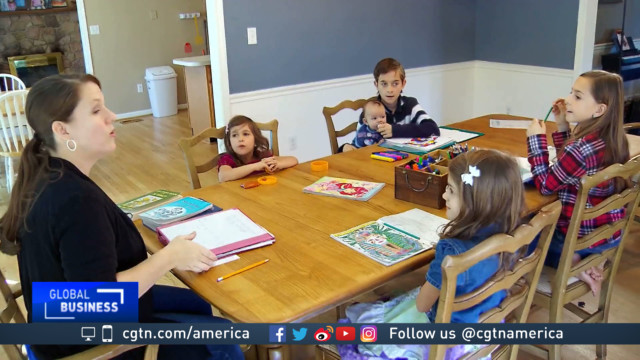There is shift in U.S. education. A growing number of parents are opting out of public schools, and are choosing to educate their children at home instead.
CGTN’s Toby Muse reports.
Follow Toby Muse on Twitter @tobymuse
Heather Favelo lets her students know that school is about to begin. “Let’s get started with our day,” she says. The four students sit around the table are attentive and ready to learn. These are Heather’s children, and they’re homeschooled.
Today, the children will learn a little art, practice their reading, and how to play the piano.
The school is here in their home in the hills of Virginia, about an hour outside of Washington, D.C.
The Favelo family is part of a growing movement of parents keeping their children out of the school system and teaching them at home.
The statistics are unclear exactly how many children are homeschooled, but some at the high-end say it could be as many as 3.5 million children in the US. And a massive boost has been the embrace of homeschooling by America’s religious conservatives.
Homeschooling “was based on our religious conviction,” says Doug Favelo explaining his and his wife’s decision to home school.
The curriculum they’ve created for their children is infused with religious teaching. They begin the day with prayers. All of this would be out of the question in a public school given the separation of church and state.
Critics of homeschooling say that it can deny children a wide variety of different views and subjects.
They also charge that children schooled at home can lack needed socialization, that ability to rub shoulder with the rest of society.
The Favelos reject this. They arrange sports outings and other social events with other homeschooled children.
The parents say that they share curriculums amongst other parents to cover the arts, sciences and even sports.
The home schooling movement has been growing progressively since it launched in the 1960s.
Mike Donnelly, director of global outreach for Home School Legal Defense Association, says many of the first proponents came from the left of the political spectrum, who were distrustful of the institution of education.
But in the 1980s, religious conservatives, frustrated by restrictions on teaching religion in school and subjects like evolution, embraced homeschooling.
And since then the phenomena has spread across the U.S. Now all 50 states allow homeschooling.
Today, Donnelly estimates that religious conservatives make up 60 percent of homeschoolers (although firm statistics on homeschooling are hard to come by).
And that homeschooling is attractive is perhaps more of an indictment of the public school system.
According to the Program for International Student Assessment, American 15-year olds scored just 38th out of 71 countries in maths and 24th in science.
Neal McCluskey on why U.S. is shrinking its education budget
CGTN’s Susan Roberts spoke with Neal McCluskey, director of the Center for Educational Freedom at the Cato Institute on top challenges in the U.S. education system.
 CGTN America
CGTN America
